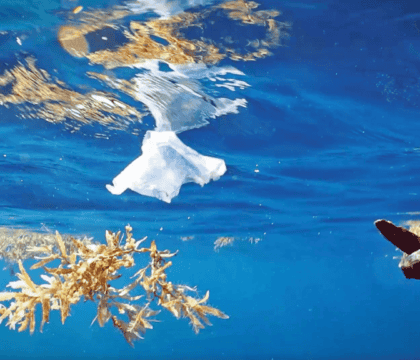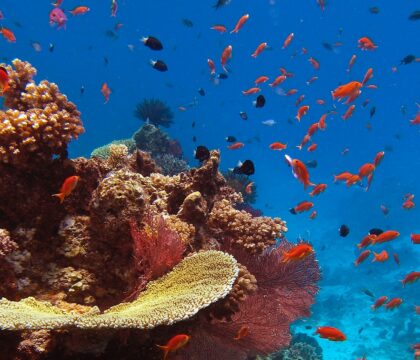March 28, 2023 • Blue Habits Tips, Resources
In its 2023 press release, the Intergovernmental Panel on Climate Change’s (IPCC) issued a clear call to action: “Urgent climate action can secure a liveable future for all.” While the annual reports from the world’s most authoritative body on climate change can be an understandable source of despair, fear, and worry, the worst thing that we can do in response is nothing. Thankfully, if you are here, you are, like us and millions of other people worldwide, looking to do more than to sit around and worry. And we are here to help.
In the following guide, we aim to provide actionable guidance and help questions like: What can I do about climate change? Can I make a difference on my own? And what are the most impactful actions I can take to reduce my carbon footprint?
Because although we need governments and businesses to take large-scale actions to fight climate change, we also cannot afford to wait for them to act. Everyone has a role to play and a responsibility to do their part, and there is no better time to take action than now.

A growing movement of people are taking personal action for climate change every day. There is no better time to act than now! © Mika Baumeister
Do my individual actions to fight climate change really matter? Don’t we need bigger changes to tackle climate change?
Combating climate change undoubtedly requires large-scale systemic change on a global scale, and governments and corporations have a critical role to play. However, people vastly underestimate the importance of individual actions in fighting climate change, especially when taken to scale. Our lifestyle choices (e.g. how much we travel, how we get around town, and what we eat), our home energy use (both how much we use and where our energy comes from), and our efforts to reduce waste, among other behaviors, both directly and immediately reduce greenhouse gas emissions and also help drive long-term systemic changes.
“Not everyone can do everything, but everyone can do something to make a difference.” Dr. Sylvia Earle
A recent report by the nonprofit organization Rare analyzed all 100 climate change solutions identified by Project Drawdown in order to understand the potential impact of individual behavior change in addressing climate change. Rare identified seven individual behaviors that have the greatest potential for impact and are both feasible and practical for people to implement without dramatic lifestyle changes. The report found that if just 10% of Americans adopt these seven behaviors, the U.S. could still meet its emissions reduction target set by the Paris agreement by 2025, even if our government fails to act with enough urgency (see the report for more details).
Without making dramatic lifestyle changes and in the absence of sweeping new policies, a small portion of Americans can have a measurable, substantive impact on reducing national emissions. – Rare (2019)
Larger, global initiatives are still necessary to create the sweeping changes we need to tackle climate change. However, these findings show that we as individuals are not powerless. Our collective actions will help fill in the gaps while we continue to fight for broader policy changes.
What are the most effective actions I can take to reduce my carbon footprint?
The short answer is: do whatever it is that you are most willing to see through and commit to. Adopting any of the key behaviors highlighted below, or other behaviors that help reduce your carbon footprint, will have an impact. The most important, and likely successful, contribution however, will come from those actions that you are able to commit to consistently.

The seven most impactful individual actions to reduce greenhouse gas emissions, as identified by Rare report
The good news is that more and more people are taking actions to reduce their carbon footprint: the sale of plant-based food has grown by 8.1% since 2017; the number of people who commute to work by bike has increased by 60% in the last decade; renewable energy is the fastest growing energy source in the U.S., increasing 100% between 2000 to 2018; electric vehicle sales grew by 81% between 2018 and 2019 in the U.S, and grew 64% globally.
Fight Climate Change Every Day
Sign up to receive tips to combat climate change in your daily life. Join the growing movement!
Not only do your actions have direct positive impacts, you can also motivate others to take action too. Behavioral science shows us that people are most likely to adopt a new behavior when they see other people doing that behavior or otherwise see evidence that a new social norm is forming around that behavior, even if that means behaving in a way that is out of step with current social norms. As a growing number of people continue to make everyday carbon-reducing behaviors the norm, the more people will follow suit.

United States, California, and San Francisco flags set against a smoky, burnt orange sky during a California wildfire. © Rhys Watkin
What else can I do to fight climate change?
Beyond adjusting your everyday behaviors, there is plenty that you can do as a consumer, voter, and activist to influence the larger systems that impact the climate.
- Be a conscious consumer and support climate-friendly businesses. Consumer activism can have big ripple effects. As of 2018, 64% of global consumers’ purchasing decisions were based on a brand’s environmental, social, or political position. Take, for example, the consumer activism around plastic straws and plastic bags that influenced industry giants such as Starbucks and McDonalds to change their business practices. Refusing plastic straws won’t save our oceans, but could lead to broader efforts to curb single-use plastics entirely. Familiarize yourself with different companies practices and support those that are taking real action against climate.
- Vote and advocate for politicians who prioritize addressing climate change. Urgent political action is needed to assure that we meet the ambitious emissions reduction targets recommended by scientists worldwide. Politicians have a critical role to play in supporting climate-friendly policies and regulating industries that contribute to global warming. Vote and advocate for politicians who are committed to government action to reduce greenhouse gas emissions and support clean energy.
- Join a community and help encourage others around you to do the same. In spite of what the news may suggest, a sizable majority of people worldwide are deeply concerned about climate change. Millions of those people are already taking individual action everyday. Moreover, research shows that people are much more likely to participate in sustainable behaviors when they feel that they are part of a community that is taking similar action. Join a climate-focused group or community to share your thoughts, ideas, and take further action, too!
Looking for more?
Coral Reefs and Climate Change: What to Know and What to Do
Test how much you know about what can be done to fight climate change.
Explore this interactive Global Temperature Trend Monitor
Watch our short film about coral reefs and climate change:

Get More Tips, Delivered to Your Inbox
Join the global movement of people dedicated to fighting climate change.




